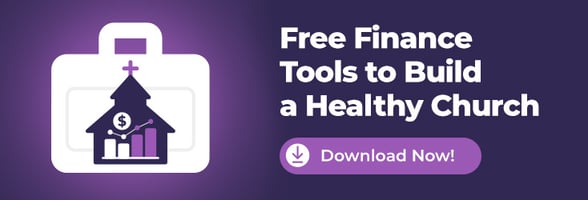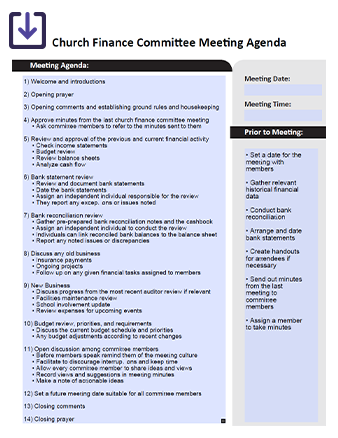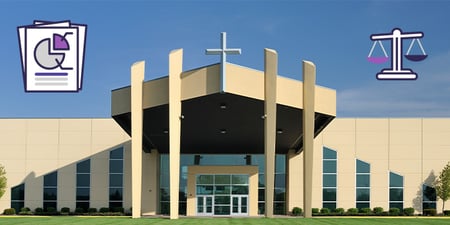
Church finance committee guidelines might seem less important than the day-to-day priorities and activities of running your church. But churches also have important financial responsibilities, as nonprofit organizations and as important members of their communities.
This guide explains the important role church finance committees and church finance committee policies play in ensuring your church operates with fiscal responsibility and transparency. You’ll learn who contributes to a church finance committee, what they do, and how they perform their responsibilities, such as creating a church budget and church financial reports. You’ll also see how these committees operate and get access to a free template you can use to set church finance committee meeting agendas.
Table of Contents
- Church Finance Committee Member Roles
- Church Finance Committee Duty Guidelines
- Additional Church Finance Committee Guidelines
- Conducting Church Finance Committee Meetings
- Free Tools & Templates to Help with Church Finances
Church Finance Committee Member Roles

Before delving into the guidelines that every church finance committee should follow, let's review who should be on these committees.
These members are responsible for making sure that their churches remain fiscally sound, so they have several vital responsibilities. These include evaluating their churches' financial records and counseling and supervising other members of their church finance boards.
Your church's finance committee should have at least three members. You should trust each member to collect and disburse funds. After all, the decisions they make will impact your church finances daily.
Here's a rundown of the core tasks associated with the main members of any church finance committee.
Your Church's Treasurer
The treasurer is one of the most important church finance committee members. This individual usually makes the majority of the monetary decisions on the committee's behalf.
This person's duties include reporting and disbursing funds. Reporting involves providing updates and reports on the following matters:
- Expenses, such as personnel
- Tithing
- Church attendance
- Finances
Disbursing funds involves allocating cash to agreed-upon expenditures and causes.
Your treasurer works with many parties at your church when executing these duties. For instance, they'll discuss significant financial decisions with the committee's chairperson (we'll discuss this person later). They'll also speak weekly with your pastor about your church's direction and health.
Your Church's Financial Secretary
Your organization's financial secretary is responsible for reporting and tracking contributions to your church. Their responsibilities also include supervising the financial offering count and depositing the offering.
Your financial secretary will need to communicate with fellow committee members. For instance, they may talk about the church's monetary resources with your treasurer. They might also discuss your church finance committee guidelines with your chairperson.
Financial secretaries also speak with their churches' pastors as needed. They might also interact with their congregations. This may happen when questions crop up about contributions or giving trends.
Your Church Finance Committee Chairperson
This individual oversees a church's financial direction and health. At your church, you may assign the following duties to your chairperson:
- Create the church's yearly budget.
- Distribute all funds received according to church leaders' recommendations.
- Recruit people who can help count church offerings.
- Keep church leaders apprised of church finance developments.
- Manage the church financial secretary and treasurer.
The chairperson is also responsible for developing strategies to generate funds to help you achieve your church's budget benchmarks.
A chairperson arranges bonding for your treasurer and other committee members who handle cash.
Now that we’ve looked at who sits on your church finance committee and their roles, let’s review their specific responsibilities in more detail.
Church Finance Committee Duties
 An important part of adhering to your church finance committee guidelines is ensuring that the members of your church's finance committee work together to perform several core duties at the committee level. These tasks are essential for maintaining and generating the funds needed to support the church.
An important part of adhering to your church finance committee guidelines is ensuring that the members of your church's finance committee work together to perform several core duties at the committee level. These tasks are essential for maintaining and generating the funds needed to support the church.
Let's explore these tasks.
Produce Revenue Projections
One of the most critical tasks your church finance committee will perform is to generate revenue projections for your organization.
This is important because you cannot budget effectively if you don't know how much cash will likely be available each year.
To do this, your finance committee can analyze your members' average donation amount. They can also assess your church members' historical giving. Your committee can review churchgoers' attendance patterns, too.
Your church's management software can generate a report for you regarding how many households your church has. Then you can figure out how much those households give to the church each month in total.
During this monetary reporting process, it is paramount that you maintain confidentiality. Your finance committee should also base their projections on actual giving patterns, not on hoped-for increases.
As an example, let's say your organization is trying to raise money for a building project. Don't assume that giving to the general fund at your church will remain the same during this time. After all, they are also trying to fund your building project.
Create Church Budget
Your committee should develop a general church budget that's based on your church's revenue projections. This budget should also reflect each church department's budget.
For instance, let's say that your youth director wants to grow their ministry. They should present a youth ministry budget that factors in their program strategy and needs. Then, they can receive the budget dollars they need to support their efforts.
Your department managers should always prepare their own budgetary estimates. This can lead to greater accountability. It can also result in accurate reporting.
The reason for this is that department managers will be more likely to follow the budgets they create themselves. After all, they understand the reasons why they proposed those budgets.
On top of this, the department managers will have nobody to blame if they don't meet their budgetary requirements.
Note that your chair should approve the budget before it's officially announced.
Review Church Budget
Church finance committee guidelines specify that in addition to creating a budget, your church finance committee members are responsible for reviewing the budget.
This involves monitoring your church's budget each month. This means that your committee members will review the money that comes into your church through online giving, for example.
They'll also scrutinize the dollars that leave the church and analyze any variances.
If your revenue projection ends up falling short in the middle of the year, the committee can adjust your budget. The same can happen if unexpected expenses crop up.
Report on Church Finances
Another essential duty of a church finance committee is to generate regular reports on the financial status of the church. This is necessary to determine if the church is sticking to its budget.
It also provides a clear picture of how well the church is performing financially with the help of tithes and offerings.
Your committee should produce annual, quarterly and monthly reports. This will help both the church congregation and leadership to stay up-to-date on budget projections and spending. They'll also learn whether offerings and attendance are increasing or decreasing.
Let's say that you are striving to raise funds for a new building. Your reports should show how much you currently have available for this project.
Likewise, if you are trying to pay off church debt, your reports should show these efforts as well.
Generate Profits
Your church finance committee needs to set aside funds to serve as the organization's safety net. The fund amount set aside should be an agreed-upon percentage of the income the church generates.
This practice is necessary for churches and other nonprofits to increase their capital. After all, nonprofits cannot legally take profits from their organizations, but they can reinvest any money above expenses in their organizations.
For example, let's say that your church generates $250,000 in revenue every year. In addition, it budgets a profit margin of 5%. This will allow you to save $12,500 per year. This can go toward church projects in the future and/or emergencies.
The reality is that even top-tier budget planning may go awry if unexpected expenses arise. So having a fund for emergencies is wise. It helps you avoid unanticipated budget variances down the road.
Teach Church Members About Budget Management
Church finance committee members should teach their church leadership about church finance committee guidelines and budget management basics.
This will help church members to interpret the reports they receive. It will also enable church members to help if somebody from your finance committee is away for a length of time.
Plus, if your church members are more financially literate, their giving may increase over the long term. As a result, it will be easier for you to accomplish your mission and vision.
Manage Debt
Your finance committee needs to create a plan for paying down debt. This prevents the church from being limited financially.
You can reduce your debt by aggressively repaying it as part of your budget. You can also launch capital campaigns to do this.
If your church is financially flexible, it is more likely to remain on budget. As a result, you will more easily achieve your future vision.
Protect Church Assets
Your church's finance committee also should work with your church board of trustees. The two teams can create policies that protect your organization's assets.
These policies should focus on instituting financial controls that protect you against risks such as embezzlement and fraud.
For instance, your committee should write policies about who can handle cash and explain how it's handled. The committee should audit the money-handling process as well.
These policies should highlight safe places for storing cash. This means supervising anybody who deals with cash in your church. Nobody should be left alone with any money donated to the church, including employees, volunteers and members.
Church staff might not like to think about the possibility of embezzlement, but this is a real concern. Research shows that in 2050, embezzlement will cost global Christian ministries about $170 billion, if current trends continue.
Your church relies on your members' generous donations to function. For this reason, your finance committee must be a good steward of these resources. Developing policies that protect your assets is an important part of this role.
These are the primary responsibilities of the members of your church finance committee, but there are a few other processes to consider. Read on to learn more.
Additional Church Finance Committee Guidelines
 Church finance committee policies are a must to protect ministry assets. These policies help create transparency. They also prevent meritless accusations of financial mismanagement.
Church finance committee policies are a must to protect ministry assets. These policies help create transparency. They also prevent meritless accusations of financial mismanagement.
Let's look at these church financial policies and processes.
Banks and Safes
For starters, at least a couple of people should be present when checks or cash are being transported. This is true whether the money is going to a bank or a safe.
If the money is being placed in a safe, the safe should remain locked.
If the safe has a key, this key should never be left unattended. Likewise, avoid placing the key in a cabinet or drawer that remains unlocked.
If your safe features a built-in combination lock, don't write the combination code down anywhere. Also, don't share the code with anybody who isn't authorized to access the safe.
Does your finance committee plan to take the cash to a bank? This should be done at least once a week to minimize the amount of cash kept in the church building.
Counting the Money
Two individuals must be present when someone is physically counting offerings and tithes. In addition, anybody else n the area should be asked to leave before the money is counted.
After one person counts the money, the second individual should be required to count the funds and verify that the amounts match.
Other Church Finance Committee Guidelines
Let's say your finance committee has itemized receipts. Somebody besides the purchasers should review them to ensure their accuracy.
Likewise, each purchased item should be evaluated. This will help to prevent illegitimate church expenses.
In addition, let's say that you designate a committee member to pay bills. Someone besides that member should approve these bills.
Have the committee review your church's bank statements monthly to catch any errors or issues early. You may also want to conduct a private audit each year. This will help to ensure that there aren't any financial discrepancies.
Finally, institute straightforward procedures for reporting any violations of these policies.
Finally, an effective church finance committee uses effective communication to ensure that church finances are sound, transparent, and safe. Committee meetings are a necessity. What are some best practices for these meetings? Keep reading!
Conducting Church Finance Committee Meetings
Meetings are where much of the church finance planning and work gets done. However, you’ll find that it’s difficult to get key stakeholders together to make important decisions. That’s why it’s important to plan ahead. Ensure each meeting has an agenda.
An agenda helps your committee cover the required topics within the limited time allotted. If you’re unfamiliar with a church finance committee meeting agenda, don’t worry, we have you covered. We built a free agenda template to help.
Download the Church Finance Committee Meeting Agenda Template!
Free Tools & Templates to Help with Church Finances
Could your church use powerful tools to help manage and maintain its finances? Here are three key resources included within our free kit to help you and your team:
- Church finance committee agenda template
- Church budget planning template
- Church finance statement template
Access all the free resources now!











